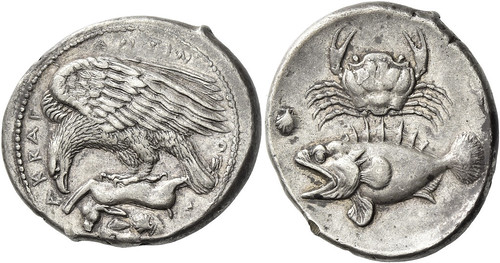
PREV ARTICLE
NEXT ARTICLE
FULL ISSUE
PREV FULL ISSUE
V25 2022 INDEX E-SYLUM ARCHIVE A CLASSIC AGRIGENTUM TETRADRACHMHere's another interesting coin I came across this week in the Numismatica Ars Classica NAC Auction 132. For more varieties of wildlife than typically depiced on coins. -Editor Sicily, Agrigentum Tetradrachm circa 420-415, AR 17.34 g. ??R?G – ????? – ? – ? Eagle l., with wings spread, perched on dead hare lying on rock against which rests a murex and a cockle-shell. Rev. Crab; in l. field, a cockle-shell. Beneath, a large fish (polyprium cernium) swimming l. Seltman, NC 1948, pl. I, i (this obverse die). Gulbenkian 163 (this obverse die). AMB 257 (this obverse die). Kraay-Hirmer 163-164 (these die). Rizzo pl. I, 16 (this obverse die). Boston, MFA 235 (this obverse die). Westermark, Akragas 529. Very rare and in exceptional condition for the issue, among the finest specimens known. A magnificent representation of masterly style, perfectly centred on an exceptionally broad flan. Wonderful light tone and good extremely fine From a Swiss collection, privately purchased from Tkalec in 1995 and notarized as being in Switzerland prior to 2004. The designs of this rare Agrigentum tetradrachm are a feast of nature in all three media – the sky, the land and the waters. The detailed depiction of the creatures reveals that this engraver was not only a talented artist, but a keen observer of the natural world. In that sense this piece ranks among the masterworks of the Classical period, for there is no attempt to idealize the subjects, only to show them in their truest form. The obverse depicts creatures from all three media by the fanciful addition of a cockleshell and a murex shell to the rocky mount upon which the eagle devours the prey only moments before it had snatched from the land beneath. The reverse limits its subject matter to the waters, but in doing so shows an exciting array, including a giant ocean perch, a crab and a cockleshell, representing three of the principal categories of creatures that reside in the waters. Though there are many varieties within the murex family, the shell here may represent the murex bandaris, from which the royal purple die was famously extracted. "Love of splendour, fairest of mortal cities, home of Persephone! Thou that inhabitest the hills of noble dwellings above the banks, where feed the sheep beside the stream of Acragas! I beseech thee, Queen, along with the kindly favour of gods and men, graciously to welcome at the ends of renowned Midas, this coronal from Pytho, I beseech thee also to welcome himself, as a champion of all Hellas in the art, which Pallas Athene invented when she wove into music the dismal death-dirge of the Gorgons bold." Thus the great Theban poet Pyndarus opens the XII Pythic, with a cletic hymn to the city of Acragas to welcome its son Midas (not an athlete, but a flautist and twice winner of the Pythian games in 490 and 486).
To read the complete lot description, see:
Wayne Homren, Editor The Numismatic Bibliomania Society is a non-profit organization promoting numismatic literature. See our web site at coinbooks.org. To submit items for publication in The E-Sylum, write to the Editor at this address: whomren@gmail.com To subscribe go to: https://my.binhost.com/lists/listinfo/esylum All Rights Reserved. NBS Home Page Contact the NBS webmaster 
|

